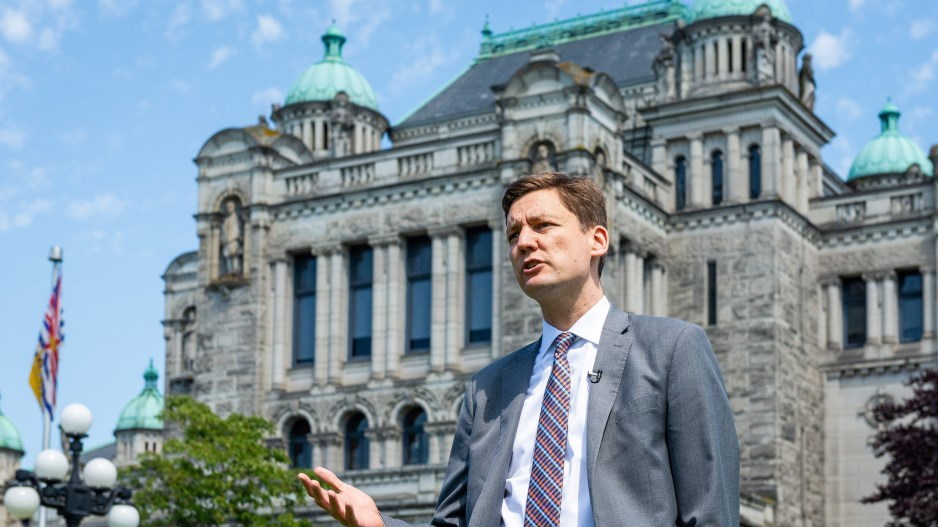The election count is final and Lieutenant Governor Janet Austin has asked B.C. Premier David Eby to form government, with the BC NDP winning 47 of 93 seats.
Even if the automatic judicial recounts in the ridings of Surrey-Guildford and Kelowna maintain those results, there's still one more catch on the NDP's way to forming a working majority government.
Of the 93 members that make up the B.C. Legislature this term, under law, one of them must be the Speaker of the House. By custom and standing orders, that member is supposed to be non-partisan so they can mediate fair and free-flowing debates.
Speakers are encouraged not to vote unless there is a tie and even then casting a vote tests parliamentarian tradition. Who that person will be remains an open question.
While the BC NDP have earned a slim majority, unless they get a BC Conservative or BC Green MLA-elect to take on the role, Eby would have to choose a Speaker from his caucus.
This would pit 46 NDP MLAs against 44 Conservatives and in a theoretical showdown that could leave the two Green candidates as the tiebreakers.
Such a scenario could also test the Speaker’s neutrality, according to University of B.C. political scientist Stewart Prest.
“Overall I’d say, for the present, this is quite a dynamic and messy situation,” said Prest.
Premier opens door for collaboration, Speaker role
As such, Eby told reporters Tuesday he is speaking to the BC Greens today and left the door open for a Conservative MLA to step forward as a Speaker candidate.
“It’s an open invitation for any MLA to work with us …one of those ways is certainly Speaker,” said Eby.
Prest said he doubts a Conservative will step forward. Doing so would give the NDP a clear majority and even result in the NDP not requiring the Greens at all.
And if a Green were to become Speaker, it would test that party’s status as an official party in the Legislature, said Prest. Furthermore, with only two members, it would put a larger burden on just one of them, he added.
“It’s a pretty complex situation where the Greens may resist,” said Prest.
He said if the NDP elect one of their own MLAs, “we end up in a thorny situation if the NDP pushes through with a bare majority,” and the Speaker casting the tie vote.
Politicized Speaker role the 'wrong direction'
Eby hinted at having the Legislature work together in advancing the interests of the province.
But Prest said forcing NDP-elected Speaker into tiebreaker situations would be “the messiest,” and would test the party’s ability to dial down partisanship.
“Moving to a more politicized Speaker is going in the wrong direction,” said Prest.
According to the provincial Constitution Act, votes in the Legislative Assembly must be determined by a majority that does not include the Speaker.
“If a vote in the Legislative Assembly is tied, the Speaker has a casting vote,” it adds.
An NDP-elected Speaker may also lead to more thoroughly debated legislation. According to the Legislature website, this is because the Speaker “uses the casting vote in such a way that further discussion will be permitted.”
That means helping advance bills to a further stage, and avoid using their vote “in such a way as to amount to a final determination of the matter.”
While according to traditional practice the Speaker should always vote for further discussion, “not all Speakers have followed this principle,” notes the Legislature's website.
Chance of an MLA wildcard
There is recent precedent, however, of an MLA crossing the floor from opposition to the centre and the Speaker’s chair.
This occurred in 2017 when BC Liberal-elect MLA Darryl Plecas put himself forward, allowing the NDP and Greens to govern comfortably under a confidence and supply agreement for three years, despite the BC Liberals winning the most seats.
Last term’s Speaker was Raj Chouhan, an NDP MLA, when the NDP had a clear majority and the Speaker’s partisanship was not tested in close votes.
Eby noted that he expects the House to sit this fall but a timeline is not clear as judicial recounts take place.
Elections BC chief electoral officer Anton Boegman told Glacier Media this week judicial recounts have historically not resulted in changes to the outcomes.


